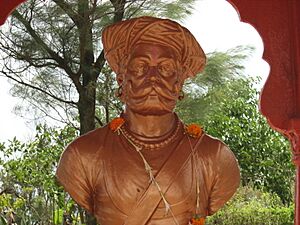Decisive victory facts for kids
A decisive victory is when one side wins a war or conflict so completely that it solves the main problems between the fighting groups. It means the winner gets a clear, positive result. It also often leads to a time of peace between the two sides.
Think of it like a sports game where one team wins by a huge margin. The game is clearly over, and there's no doubt who won. An "inconclusive victory," on the other hand, is when one side wins, but the big problems between them are still there. Armies usually want a quick and decisive victory with very few casualties (people hurt or killed).
For example, the Six-Day War in 1967 was a decisive victory for Israel. They won against the armies of Egypt, Syria, and Jordan. This made Israel a strong power in the Middle East and brought about six years of peace. During the Cold War (1947-1991), the idea of a decisive victory seemed less likely. This was because of nuclear weapons. People thought that smaller, "limited wars" were safer. They would not grow into a full-scale war that could destroy everyone.
Contents
What Makes a Victory Decisive?
Carl von Clausewitz, a famous military thinker, wrote about decisive victory in his book On War. He said a decisive victory means making your opponent unable to fight anymore. War is about using force to make the enemy do what you want.
To weaken an enemy, a general must find their "center of gravity." This is the main source of the enemy's power. It could be their army, their people, or their economy. Clausewitz believed that a war must end in a decisive victory, or it will just keep going. He also famously wrote: "There is only one decisive victory: the last."
Sun Tzu, another ancient military expert, also wrote about this in The Art of War. He said that a smart fighter makes the enemy follow their will. They do not let the enemy control them. He also added that skilled warriors bring the enemy to the battlefield. They do not let the enemy bring them.
Famous Decisive Victories
Many battles throughout history have been decisive victories. They changed the course of events in a big way.
Battle of Marathon
The Battle of Marathon was a huge victory for the ancient Greeks over the Persians. This battle stopped the first Persian invasion of Greece. It showed that a smaller force could defeat a much larger one with good strategy.
Battle of Hastings
The Battle of Hastings happened on October 14, 1066. It was a fierce fight between the English and an army from Normandy. The English King Harold Godwinson was killed during the battle. The winner, William, Duke of Normandy, became King William I of England just 10 weeks later. This Norman conquest completely changed England's history.
Battle of Yorktown (1781)
The Battle of Yorktown (1781) was a decisive victory at the end of the American Revolutionary War. The American and French forces defeated the British Army. The British general, Charles Cornwallis, thought he could end the rebellion by setting up a fortress in Yorktown, Virginia.
American General George Washington and French General Rochambeau saw a chance to trap the British. They marched their armies to Yorktown and started a siege. The French navy stopped the British fleet from sending help to Cornwallis. About a month later, Cornwallis surrendered. This effectively ended the war.
Battle of Midway
The World War II Battle of Midway took place from June 4 to June 7, 1942. It was a huge victory for the United States Navy over the Japanese Navy. This battle was a turning point in the war. It allowed the U.S. forces to start attacking the Japanese.
The Japanese fleet commander, Admiral Isoroku Yamamoto, wanted to attack Midway Island. He hoped to draw out the few remaining U.S. Aircraft carriers and ambush them. But the Americans had a secret weapon: they had broken the Japanese coded messages. They knew exactly what the Japanese plan was.
The battle resulted in the complete destruction of the main Japanese carrier fleet. They lost four aircraft carriers, 322 aircraft, and over five thousand sailors. The Americans lost 147 aircraft and about three hundred sailors. While this battle did not end the war directly, it severely weakened Japanese sea power. It stopped Japan from being able to stop the Americans and their allies.
See Also
- Strategic victory
- Tactical victory
- Pyrrhic victory
- Victory


